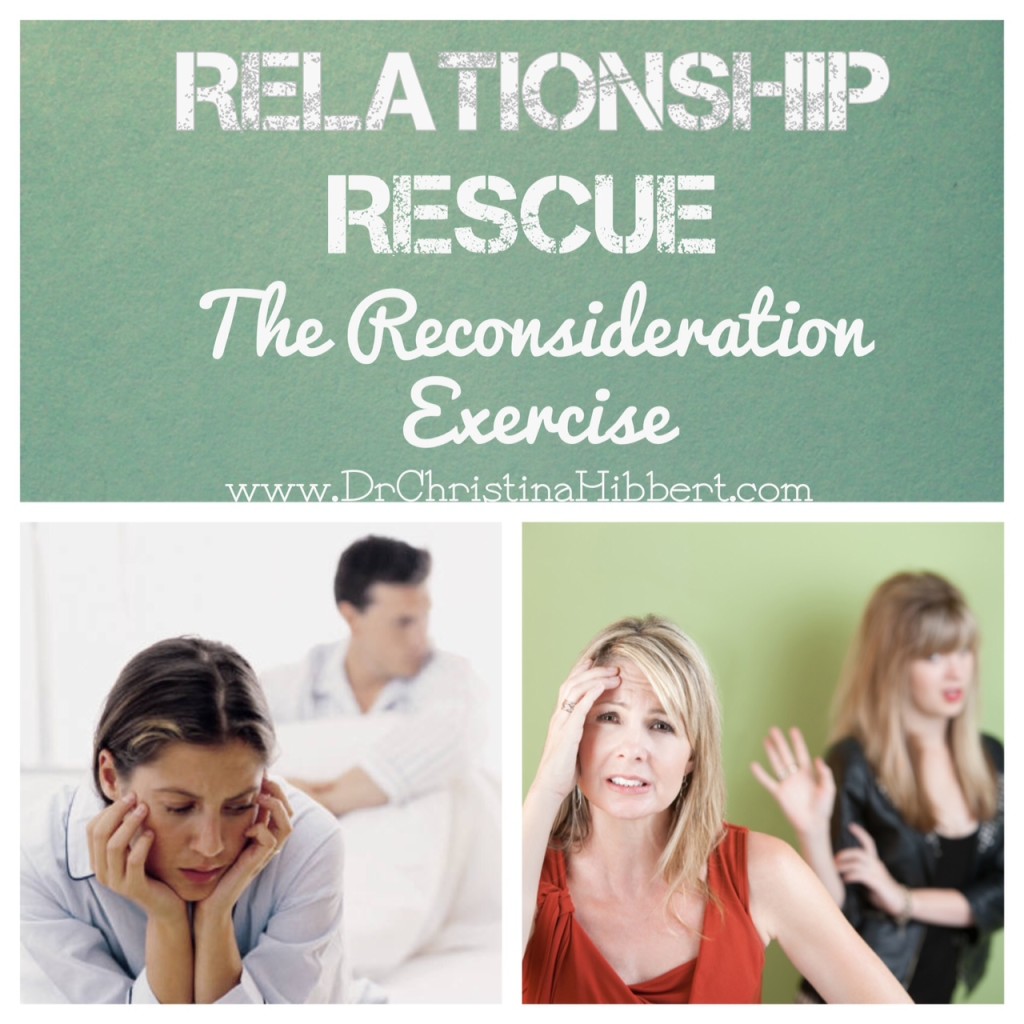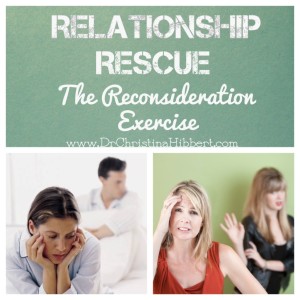
21 Oct Relationship Rescue: “The Reconsideration Exercise”
Relationships can be exhausting, especially when we lose sight of the person we really love. We can get so entrenched in our feelings, our position, our hurt, that we fail to see the efforts, large or small, of the other.
One of the books that’s made the biggest difference in my life is Bonds that Make us Free, by C. Terry Warner. I actually learned the principles from this book back in college, at BYU, when Dr. Warner was my professor for a seminar based on his yet-unpublished manuscript. The concepts I learned in that class opened my eyes to my role in my relationships, helping me see how I betray myself every time I fail to do the thing I know is right. Every time I ignore that little voice telling me to just love the other person, I am part of the problem. Picking up the published book several years ago was an epiphany for me. It reminded me of what I’d learned long ago but so much more. I used the principles to try and help me understand my mother and father, to improve my relationship with husband, OJ, and our kids, and mostly, to improve myself.
Improving Relationships with “The Reconsideration Exercise”
One exercise from Bonds that Make Us Free which had a profound impact on me was “The Reconsideration Exercise” (see the exercise, below). This exercise encourages us to get out of our own perspective and see the other person as they really are.
It’s kind of like my work as a psychologist. Couples come to me for help, but they can only see each other for “what he did” or “what she said to me.” They can’t see one another purely. But, as the psychologist, the outside observer who is uninvolved in the relationship struggles, I see each person for who they really are. I see their strengths and weaknesses, their pain and heartache, and I usually see that both people are feeling the same way–they both hurt and desire greater love. Having this unbiased perspective helps me help the couple I’m working with to rescue their relationship. The “Reconsideration Exercise” works the same way.
My Experience with “The Reconsideration Exercise”
The first time I did this exercise was for my relationship with my mother. For years, we’ve had trouble understanding one another. I’ve felt, at times, like my mother wasn’t there for me. She’s felt, at times, like I’m too critical of her. She didn’t even know I was doing this exercise, yet it helped our relationship tremendously! Doing this exercise was the first time that I was able to step outside of what “my mother did or didn’t do to me,” to step outside of how I was feeling and see my mother as an individual.
I saw the happy mother who’d had the best dressed little girls at church, who played with me, who drove me to countless dance and piano recitals, whom I borrowed Reebok high-tops (in every color) from in high school, who was “cool,” “fun,” whom my friends admired, whom I wanted to be just like some day. I saw her hurts—a mother who had lost her beloved father and then her youngest daughter, to cancer, and had survived breast cancer. I saw more than the grief and depression my mother had seemed caught in for years. I saw a survivor, who would yet survive losing another daughter, son-in-law, and their family, a woman who doesn’t give up even when everything in her tells her maybe she should. I saw her for her strengths and for her weaknesses. I saw her.
This first experience was so powerful–it helped me accept my mother at the time and let go of so much–I repeated it with my husband, kids, friends, and other family members over the years. I’ve also assigned it to couples, to mothers and daughters, and families of all types, in therapy, in an effort to help them “reconsider” one another.
Reconsider Your Relationships and See
Stepping outside our “box” and really seeing others allows us to relate to them as human beings—as they really are, and not just as they affect us. It prevents the standoff of who hurt who, who’s at fault, the blame game. It allows us to step out of our own way so we can see what is really happening. Try the reconsideration exercise (below). You may be pleasantly surprised with what you see.
The Reconsideration Exercise
“Imagine you are living in a world that is different from this present world. You are different, in that you are taking no offense. No matter what others may be doing, you do not feel they are hurting you psychologically or emotionally. You harbor no accusation within your heart. In this imagined situation, yours is an I-You way of being. But this is the only difference between your imagined world and the present actual world. In your imagined world, everyone else is exactly the same as they are right now.
“Now from your imagined perspective, think of someone who has inconvenienced, irritated, or injured you in some manner, or who is doing so now. Think about that individual as long as you like—but if at all possible only from within the I-You mode.
“Then, when you feel ready, take a pen or pencil and write a description of that individual.
“Don’t try to make that person seem better than she (or he) really is; don’t just tell all her good qualities and ignore the bad. Instead, describe her accurately; describe all her qualities—those you have up to now thought bad as well as those you’ve thought good. Just be sure to describe them, if you possibly can, from your new, unoffended point of view…. Tell the truth.”
(From C. Terry Warner, Bonds that Make Us Free: Healing our relationships, coming to ourselves, pp. 162-3)
[author] [author_image timthumb=’on’]http://www.drchristinahibbert.com/wp-content/uploads/2012/03/square-head-shot1.jpg[/author_image] [author_info]Clinical Psychologist, Mom of 6, Postpartum Couples DVD Producer, Non-Profit Founder, and expert on Parenting, Women’s Emotions, Pregnancy & Postpartum, Self-Esteem, and Grief & Loss, Dr. Christina Hibbert loves songwriting, learning, and teaching what she learns. She’s a strong believer in doing what it takes to make relationships work.[/author_info] [/author]
Give the “Reconsideration Exercise” a try. What do you think? Was it helpful? How might this exercise and concept improve your relationships? Please leave a COMMENT, below!
Don’t miss a thing! SUBSCRIBE, below, and please “Like” my Facebook page or follow me on Twitter or Pinterest for more tips, tools, and inspiration on the topics that matter to you!
[subscribe2]
Related Articles/Posts
17 Secrets for Making Marriage Work (In Honor of our 17th Wedding Anniversary)
50 Ways to Love Your Loved Ones
“The 5 Love Languages”: Improve Relationships and Feel the Love (plus video)
Practicing Patience: 20 Ways to Be More Patient Today
How to Get Your Needs Met: 4 Tips on Asking & Receiving
Parenting Success Skills, Top 10: #1 Do Your Own Work First
Stress Management: 15 Proven Ways to Stress Less (& Smile More!)
In Praise of Fathers: 10 Ways Dads Impact Kids for the Better
Weather the Storms Together: 4 Ways to Strengthen Families Through Times of Stress
Parenting Skills: “My Kids Are Driving Me Crazy!”: 10 Ways to Drive us back to Sane


I’m afraid I did not understand at alL Would it be possible to explain this a little more?
Thank you for your honesty, Wilhelmina. I can see why it might be confusing, so I went back and added a couple more sentences of explanation under “Improving Relationships with the Reconsideration Exercise.” So, thank you for helping me clarify things in the post.
Basically, this little exercise just asks us to imagine the person we’re having trouble with as if you weren’t affected by them at all. As if you’d just met them and were learning all about them. What are their strengths? Their weaknesses? Their pains, heartaches, and losses? Why do they act like they do? Are they insecure? Are they working hard to be the best they can be, but it doesn’t come across the right way? What would someone else say about this person?
Getting out of our own “box” means stepping back and seeing others as they really ARE instead of how they are TO US. Does that help? I hope it does. And I hope you’ll give this exercise a try, then let me know what you think. 🙂
Hi Christina! Wow! I LOVE this exercise! It’s fabulous!
Thank you, Kathy! Obviously, I agree. 🙂